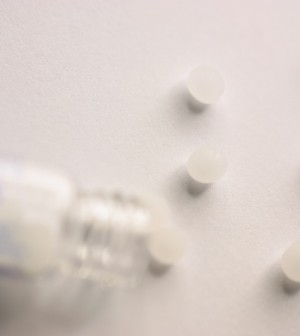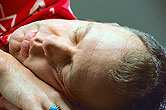- Could Your Grocery Store Meat Be Causing Recurring UTIs?
- Are You Making This Expensive Thermostat Error This Winter?
- Recognizing the Signs of Hypothyroidism
- 10 Strategies to Overcome Insomnia
- Could Artificial Sweeteners Be Aging the Brain Faster?
- Techniques for Soothing Your Nervous System
- Does the Water in Your House Smell Funny? Here’s Why
- Can a Daily Dose of Apple Cider Vinegar Actually Aid Weight Loss?
- 6 Health Beverages That Can Actually Spike Your Blood Sugar
- Treatment Options for Social Anxiety Disorder
Gout Attacks More Common at Night: Study


Acute gout attacks occur two times more often during the night and early morning than during the day, a new study finds.
“It is speculated that lower body temperature, nighttime dehydration, or a nocturnal dip of cortisol levels may contribute to the risk of gout attacks at night,” study author Dr. Hyon Choi, of Massachusetts General Hospital/Harvard Medical School, said in a journal news release.
“Despite the possibility of a nighttime link to gout, no study prior to our current investigation has looked at the association between gout attack risk and the time of day,” Choi added.
More than 8 million Americans have gout, according to the American College of Rheumatology.
The current study included more than 700 gout patients. Their average age was 54. They were mostly white, and mostly male, according to the study.
The researchers tracked their health for one year. During that time, there were almost 1,500 acute gout attacks.
Of those, more than 700 occurred between midnight and 7:59 a.m. Around 300 happened between 8 a.m. and 2:59 p.m. And, almost 400 attacks occurred between 3 p.m. and 11:59 p.m., according to the findings in the journal Arthritis & Rheumatology.
Compared to daytime, the risk of an acute gout attack was more than twice as high overnight.
The increased risk was seen even among patients with low purine intake in the 24 hours prior to an attack, the researchers found. When breaking down purines, the body produces uric acid. Acute gout attacks are triggered by the crystallization of uric acid within joints. Certain foods are high in purines, including organ meat, seafood and alcohol.
“Our findings provide the first prospective evidence that the risk of gout flares is higher during the night and early morning hours than during the day,” Choi concluded. “As a result of our study, [preventive] measures that prevent gout flares, especially at night, may be more effective.”
More information
The U.S. National Institute of Arthritis and Musculoskeletal and Skin Diseases has more about gout.
Source: HealthDay
Copyright © 2026 HealthDay. All rights reserved.










